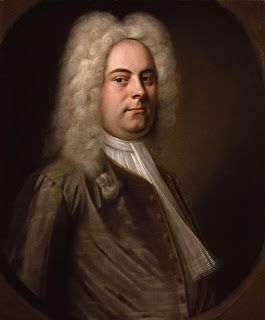Messiah is one of the most celebrated sacred works of the last three centuries. Written by George Frederick Handel (1685-1759), it has been performed by ensembles of different formats, with the Hallelujah chorus being the most famous chorus of all time.
Written in 1741, it took Handel only 24 days to complete the entire oratorio. The libretto (text) was created by Charles Jennens and it was inspired by the King James version of the Bible. The entire work focuses on Christ's work in his birth, life, death, resurrection, and ascension, with a great emphasis on Old Testament prophecies regarding Christ, and their fulfillment.
The musical score is immense and has proven to be not only great performance material, but alos great material for serious music study. At the end of the manuscript, Handel wrote the letters "SDG" which stand for "Soli Deo Gloria" ("To God Alone The Glory"). This is an inscription also used by the great J.S. Bach in his own manuscripts. It should be noted that the original score was much smaller than many versions we hear performed today. Later composers wanted to give the work a bigger sound, and many added instruments to the orchestration. Lately, there have been some acclaimed ensembles that returned to the original score, which is much smaller than what we are used to hear. Just as an example, the original arrangement called for thirty-two chorus members: sixteen men and sixteen boys, plus the four solos. Not the big sound we are used to hearing during the holidays on TV and Radio!
The first performance was give in Dublin and it raised a considerable amount of revenue, and Handel donated all of it to three charities:
- prisoner's debt relief
- local Mercer hospital
- local charitable infirmary
Besides helping the Mercer hospital and the local infirmary, Handel's contribution freed 142 indebted prisoners.
There were seven hundred people in the audience at the first performance on April 13. In order to allow as many people in the audience as possible, it is said that all men were asked to remove their swords, and all the ladies were asked not to wear hoops in their dresses... The local press praised the performance using these approximate words: "Words are wanting to express the exquisite delight in afforded to the admiring and crouded Audience" (Luckett, pp. 127-28).
A local clergyman, Rev. Delaney, was supposedly so overcome by the performance of "He Was Despised" (an alot solo) that he jumped to his feet and shouted: "Woman, for this be all thy sins forgiven thee!" (Hogwood, pp. 22-25).
Below is a drawing of the Great Music Hall in Dublin, where the Messiah was first performed.


No comments:
Post a Comment